|
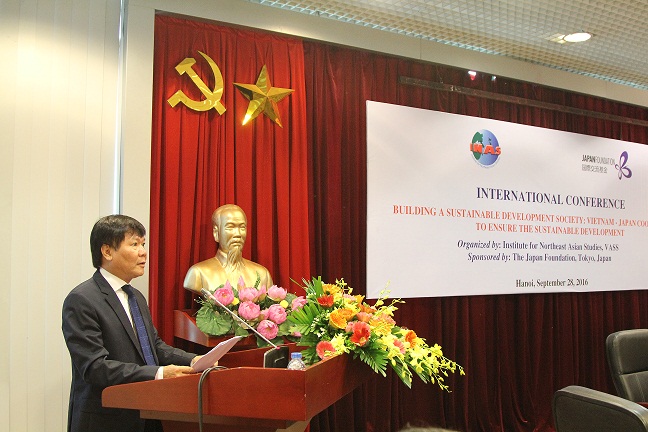
|
Conference participants from Japan are Mr Nagai Katsuro, the Envoy of the Japanese Embassy in Vietnam; Ms Mariko Mugitani, Deputy Director of the Asian Program, Japanese Studies and Intellectual Exchange Department, Japan Foundation in Tokyo; Mr Kawai Jun, Deputy Director of the Japan Foundation Centre for Cultural Exchange in Vietnam; Ms Noriko Nishimura, representative of Political Section and Mr Nakano Akihiko, representative of Economic Section, the Japanese Embassy in Vietnam; and other Japanese scholars. Conference attendees from Vietnam are Prof. Dr. Nguyen Quang Thuan, President of VASS; Ass.Prof., Dr. Dang Nguyen Anh, Vice President of VASS; Dr Tran Quang Minh, Director of Institute for Northeast Asian Studies; Assoc.Prof., Dr. Pham Quy Long and Assoc.Prof., Dr. Pham Hong Thai, Deputy Directors of Institute for Northeast Asian Studies; leaders of VASS member institutes; more than 20 Vietnamese scholars, almost 100 researchers and lecturers from VASS member institutes and a number of universities in Hanoi (such as National Economics University, Hanoi University, University of Languages and International Studies -Vietnam National University, Ministry of Culture, Sports and Tourism, and so on) and all staff of Institute for Northeast Asian Studies.
Currently, the world is entering into a new period of major changes with the emergence of global problems in the economic, social and environmental areas. In the economic area, the quicker the growth is the more severe deficiencies in materials and energies due to scarcity of natural resources become. In the social area, the gap between the rich and the poor which has resulted in the social instability became one of the most worrying problems in many countries, especially in developing countries. The environment is faced with serious problems such as global warming, threats to biodiversity, desertification and the like. Therefore, development with a balance between economic growth, social stability and environmental protection has amounted to a strict necessity for the world.
|
|
|
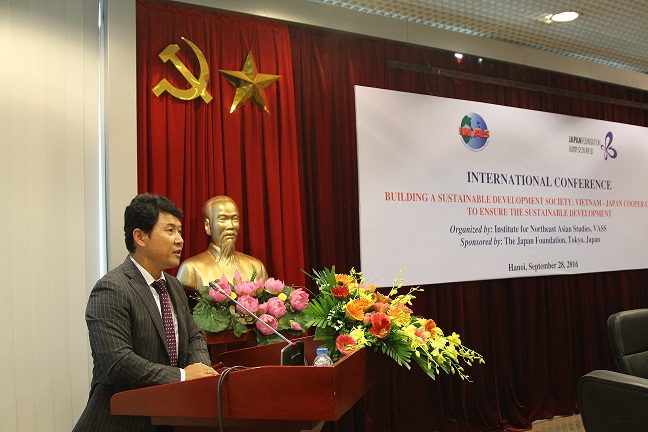 |
In Vietnam, sustainable development plays an important role in making public policy as well as in the academic world. It has attracted an increasing attention from policy makers and researchers. Sustainable development is regarded as a basic goal in innovating models of growth, guaranteeing social equality and protecting environment towards which Vietnam has been oriented. The Prime Minister of Vietnam already approved the National Green Growth Strategy. However, Vietnam is still faced with inadequacies, limitations and challenges in the process of implementation of this policy in spite of progresses it has gained in ensuring sustainable development.
In his opening speech to the conference, Prof. Dr. Nguyen Quang Thuan welcomed the presence of delegates and researchers. He confirmed that in the context of a changing world and a changing Vietnam, further research, more discussion and reference to international experiences as well as enhancement of cooperation with various partners have become a prime requirement in order to succeed in realizing the national strategy of industrialization and modernization towards sustainable development. This means that Japanese experiences in ensuring sustainable development in the economic area will be useful lessons for Vietnam. At the same time, he highly appreciated the considerable assistance of Japan in the economic, cultural and social areas as Japan is the top strategic partner of Vietnam.
The conference is a rare occasion when Vietnamese and Japanese scholars viewed and assessed comprehensively the process of building a sustainable development society in two countries. Amongst other things, noteworthy are the significant issues which should be advanced in cooperation between Vietnam and Japan with a view to ensuring sustainable development of Vietnam, based on Japanese experiences.
Speaking at the conference, Mr Nagai Katsuro asserted that sustainable development is an important issue the United Nations set out in the Sustainable Development Goals on a global scale. At the same time, he affirmed that Japan was very active in its efforts to establish policies in order to implement the idea of sustainable development. Mr Nagai Katsuro also acknowledged great achievements Vietnam and Japan have gained in the cooperative relationship between two countries with regard to socio-economic development, responses to climate change and environmental solutions. He hoped that opinions presented at the conference by Vietnamese and Japanese researchers in different domains will be used as important recommendations for the Vietnamese government in making public policy in relation to sustainable development, in enhancing abilities of elasticity of society, and hence contributing to development of Vietnam and to cooperation between two countries.
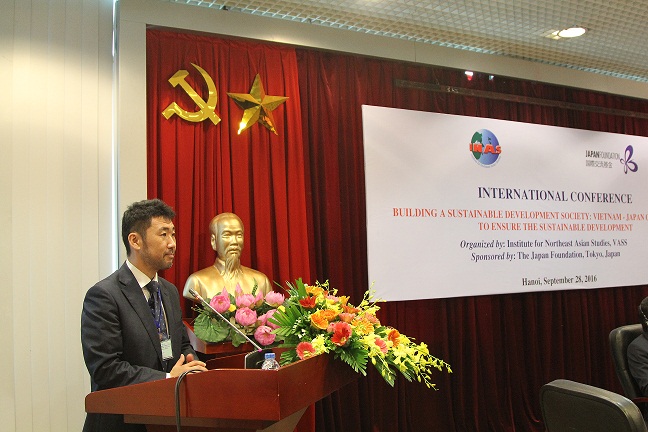 |
|
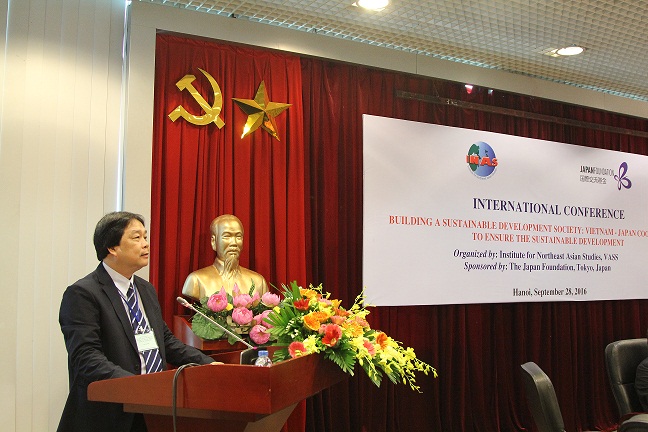 |
On behalf of the Japan Foundation, Mr Kwai Jun introduced to the conference an overview of main activities undertaken by the Japan Foundation. He insisted that research into aspects of sustainable development or abilities of elasticity to reach a new development in the future plays an important and urgent role in the modern society fraught with a host of changes like Japan and Vietnam. This is also a shared interest of the whole world. He expected that the conference will be a suggestion for further research project of cooperation between researchers of both countries in the coming years.
The conference’s organizers received a total of 31 papers. Amongst these, 16 papers were presented at the conference. The conference was divided into 4 sessions, discussing 4 main topics as follows:
Session 1: Sustainable Development - An inevitable road to development. Scholars (Assoc.Prof., Dr Dang Nguyen Anh; Prof. Oyane, Senshu University; Dr. Hoang Van Cuong, Central Institute for Economic Management. Ministry of Planning and Investment; Prof., Dr. Dimiter Ialanzov, Kyoto University, Japan) discussed social sustainability - an important orientation of Vietnam in the new period of development; new standards for construction of a society which prevents from and fights against disasters in a sustainable manner (by judging activities of restoration amongst communities); ensuring social security - a solution to socio- economic sustainable development of Vietnam; sustainable development in Vietnam in terms of developing renewable energies.
Session 2: Cooperation between Vietnam and Japan in ensuring sustainable development in the economic aspect. There were 4 papers presented in this session by Prof. Dr. Mizobata Satoshi, Director of the Kyoto Institute of Economic Research (KIER), Kyoto University; Assoc. Prof. Nguyen Duy Dung, Director of Institute for Southeast Asian Studies, VASS; Prof. Ito Tetsuji, Director of Institute for Global Change Adaptation Science (ICAS), Ibaraki University; Mr. Ha Huy Ngoc, Institute of Human Geography. These scholars deliberated the issues of economics with regard to structuring a sustainable development; economic cooperation between Japan and Vietnam; economic growth towards sustainable development in Vietnam and the possibility of cooperation with Japan; local communities in sustainable development - from the viewpoint of disaster prevention and experiences in fighting against natural disaster; implementation of the national green growth strategy: an inevitable road to sustainable development in Vietnam.
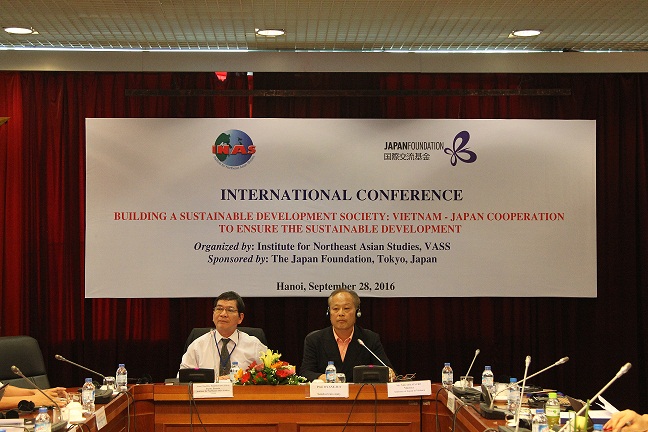 |
|
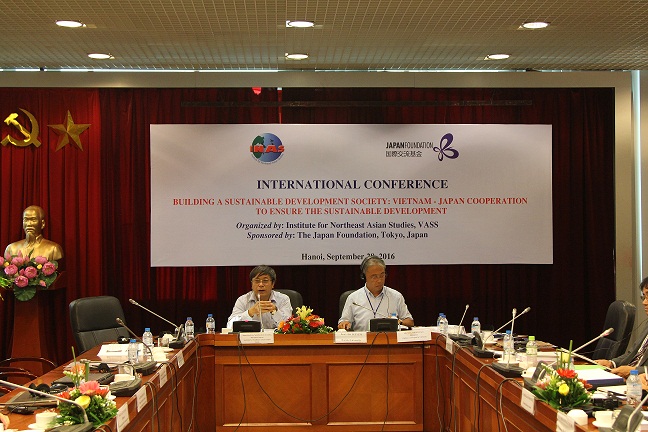 |
Session 3: Vietnam - Japan cooperation in ensuring sustainable development in the social area. Speakers of this session were Dr. Nguyen Thi Thu Phuong, Vietnam National Institute of Culture and Arts Studies, Ministry of Culture, Sports and Tourism; Prof. Murakami Shunsuke, Director of Institute of Social Sciences and Prof. Shimane Katsumi, Senshu University; Dr. Tran Thi Nhung, Institute for Northeast Asian Studies. The issues addressed at this sessions include: analysis of the policy on development and cultural - professional change amongst communities (research into impacts of ‘Project on removing people living in floating boats in Halong Bay’ on the population of fishing villages); a change in points of view in Japan in research on Vietnam; Vietnam - Japan cooperation in the area of health care (achievements and prospects); funeral ceremony in modern societies: A comparison between Vietnam and Japan.

Session 4: Vietnam - Japan cooperation in ensuring sustainable development in relation to environment. 4 papers were presented in this session by M.S. Nguyen Dinh Hoa, Vietnam Institute of Economics, VASS; Prof. Dr. Tamura Makoto, Ibaraki University; Dr. Duong Thi Toan, University of Science, Vietnam National University Hanoi; Prof. Dr. Yasuhara Kazuya, Ibaraki University). These researchers discussed Vietnam-Japan cooperation in using natural resource and environmental protection in terms of sustainable development; research into adaptive response to climate change in coastal regions of Vietnam (with sustainable development approach); outcomes of cooperation between Vietnam and Japan in undertaking research on securing sea dikes in Hai Hau district, Nam Dinh province in the context of climate change; lessons from coping with floods in Joso city caused by the dike rupture surrounding Kinugawa river in 2015.
|
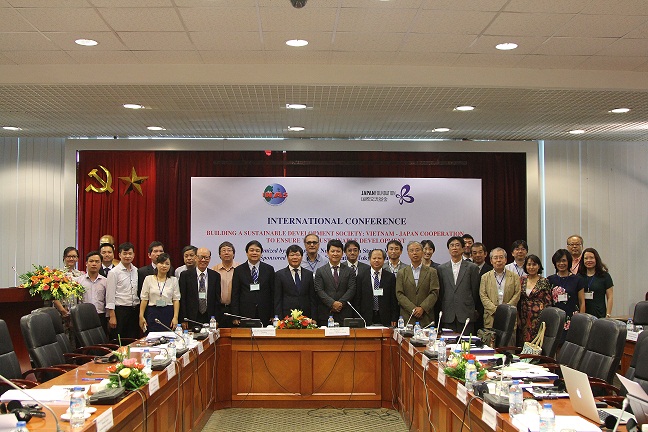
|
Speaking in his closing speech following 4 sessions, based on ideas presented at the conference by scholars of both countries, Dr. Tran Quang Minh summarized the main contents of discussion as follows: 1, With regard to the model of development, Vietnam needs to innovate its current pattern of growth for sustainable development; 2, With regard to the policy of growth towards sustainable development by the Vietnamese government, there is a gap between making policies in theory and implementing policies in practice; 3, With regard to experiences of Vietnam and Japan in ensuring sustainable development (through pointing out research outcomes on the basis of analysis of information gathered from field surveys, fieldwork), noteworthy is the new position of Japan on ‘elasticity’ or abilities of ‘restoration’ in a community, a society, a nation, and so on; 4, With regard to enhancing cooperation between Vietnam and Japan towards sustainable development, the focal points should be innovating the model of growth towards sustainable development, from brown growth to green (the emphasis thereof is on establishing and using renewable energies), ensuring social security in terms of healthcare, education, salary, insurance, housing, and such like), training individuals, communities, social groups in order to equip them with abilities of adaption in response to ‘shocks’ caused by nature or human beings.
The conference was successful. This was a helpful forum where scientists from different areas of research could meet and exchange ideas about building a sustainable development society. In so doing, it contributes to boosting the long relationship with Japanese universities and Japanese researchers, enhancing research activities, networking and intellectual exchange amongst domestic and overseas researchers. All of these are directed towards a strong enhancement of cooperation between Vietnam and Japan in ensuring sustainable development in years to come.
Nguyen Thu Trang







